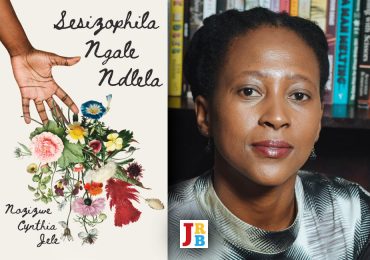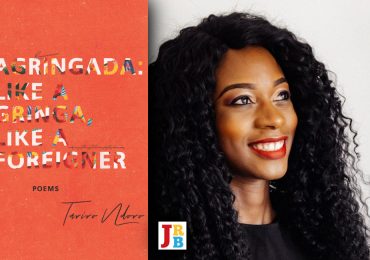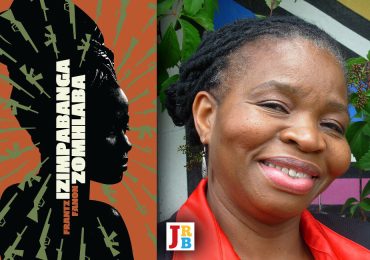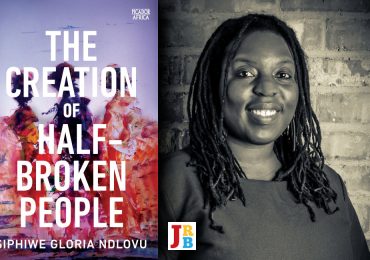Siphiwe Gloria Ndlovu, author of The Theory of Flight, interviewed novelist and screenwriter TC Farren on her latest work of fiction, The Book of Malachi.
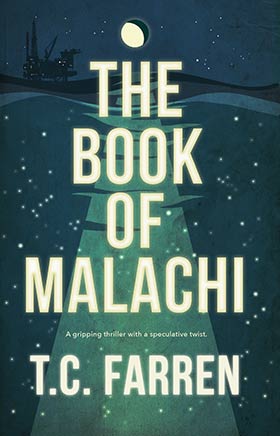
The Book of Malachi
TC Farren
Kwela, 2019
Farren’s debut novel, Whiplash, was shortlisted for the Sunday Times Fiction Prize and subsequently adapted by the author into a screenplay, which became the film Tess, and which won Best South African Feature Film at the 2016 Durban International Film Festival. (Whiplash was then re-released as Tess.)
In The Book of Malachi, Malachi Dakwaa is mute and utterly disconnected from human beings when he gets an extraordinary job offer. In exchange for six months as warder on a top-secret organ farming project, Frasier Pharmaceuticals will graft a new tongue for him. Malachi takes the deal. Far out to sea, he finds himself among warlords and mass murderers of the kind who maimed him and killed his family. But are the prisoners as evil as Frasier says? Do they deserve their fate?
Siphiwe Gloria Ndlovu for The JRB: The Book of Malachi presents the reader with a remarkably uncanny and rather unique story, what was your inspiration?
TC Farren: I was living in a silent, white suburb behind a high wall on a blind rise. Only the cats roamed the streets while the residents hid inside their houses reading about the gang rapes and home invasions taking place all around them. I became more and more disorientated by this bunker-like existence and started fretting about a spiritual question: how is it possible that we share a spirit with people who do terrible things? I created a character, Malachi, with enough motive and courage to hang out with life-sentence criminals and look into this. He was not all that happy to carry out my writer’s mission—he would have preferred to take his new tongue and run, but Malachi’s grief and his good heart drew him in deeper.
The JRB: And because Malachi allows himself to be drawn in deeper, we
come to see that people rarely do terrible things without a reason. Terrible things tend to happen within a context that is often worth understanding and empathising with. I think that this is something that the book explores well.
I know you are also a screenwriter, and indeed, there is a rather cinematic scope to The Book of Malachi. In many ways the novel seems to rely on the visual as much as it does on the verbal. Does your film writing inform your writing of narrative fiction?
TC Farren: I think I have always been a visual writer, even before I turned my hand to film writing. I suspect all of our imaginations work in moving images but for me the trick to writing this book was to slow down the ‘movie player’ in order to be in Malachi’s skin. I do find that after years of redrafting film scripts I can’t help but see stories in three huge movements with bitter opposition between what a character wants and what they need. I have come to love this inner conflict as the wonderful engine that drives the story forward.
The JRB: Given the harrowing world you have created, in which most humans have been dehumanised (and I use that world very carefully) by violent histories and unethical institutional practices, the familiarity of a three-act structure and the archetypal hero’s journey really help the reader join Malachi on his journey. What are some of the benefits of working in two different modes, fiction and film?
TC Farren: I think one of the benefits of working in film is the tradition of tracking a hero’s journey and teasing out the moments of greatest change. It feels like novels need these big turning points all the more as the characters detour, ruminate and remember, marching towards their greatest desire. For me, the sad thing about film writing is that there is simply no place for the gorgeous possibilities of words. Good film scripts, they say, should contain only bare bones and acres of blank, ‘white space’.
The JRB: It is interesting that you say that, because the cinematic quality of the story presents us with a large cast of characters who seem to lack that wonderful thing that the narrative fiction form gives us: interiority. The only character whose interiority we see is Malachi and that is because the story is focalised through him. In true film fashion we get ‘back story’ but not a real ‘deep dive’ into the other characters, and it seems very deliberate on your part that you choose to close off these other characters, in a sense.
TC Farren: I wanted to create the feeling that Malachi was deeply prejudiced against all forty prisoners and had no desire to get ‘sucked in’. It made sense to shut them out while he was desperate to despise them, but as he began to open his mind and heart I went deeper into their histories and personalities. The cast proved too large, however, and I found that this detail diluted potential readers’ capacity to feel for Malachi. I made a conscious decision to take some painful cuts and focus only on the people who triggered big changes in him.
The JRB: You have said, previously, that you were not aware, as you were writing The Book of Malachi, that you were writing a work of speculative fiction. I am just curious as to what genre you saw this work belonging to, at the outset?
TC Farren: I wanted the main time frame to be the nebulous time of the individual psyche, not time in human history. Set only fifteen years from now, the novel is less a ‘world building’ project than an excavation of the darkest place of our species. Some people are describing it as part horror, part thriller, but I prefer the genre ‘psychological thriller’ because there is a wry humour to Malachi that, many readers say, lifts the narrative. Also, the worst has already happened before the story even starts and now each character must surrender to their insanity or begin their healing with Malachi.
The JRB: The title, The Book of Malachi, is taken from religious texts found in the Judeo-Christian tradition. Several things about that seem pertinent to the story that you have written—to name but a few, the fact that the Book of Malachi is the last book of the Old Testament (and, therefore, in the Christian faith, the book that precedes the New Testament and the story of Jesus Christ) and that the Book of Malachi seeks to remedy the corruption of a peoples’ relationship with their God. These allusions to the biblical text seem to suggest that your hero, Malachi, is a messianic character.
TC Farren: Strangely enough, I didn’t know about the Old Testament Book of Malachi until after I had named the novel! I didn’t know that it was the darkest book in the Bible, nor that it warned people of God’s wrath if they did not abide by his laws. I am proud that Malachi brings a message contrary to the threat of catastrophe that ends the Old Testament. The silent man on the rusted oil rig discovers that there is hope for all people to manifest the light inside them and that, try as they might, they will never extinguish the impulse of their spirit to love. Malachi Dakwaa becomes convinced that the terrible things people do are merely a futile denial of their essence, which is most certainly love. I guess Malachi is messianic in that he comes to believe that it’s just a matter of time before the light triumphs.
The JRB: For those of us who love (or hate) postcolonial theory, the fact that Malachi’s tongue has been cut off during a civil war, and that this act has rendered him not only speechless but also voiceless, immediately brings to mind Gayatri Spivak’s ‘subaltern’ figure. Malachi is the byproduct of violent histories, he is a menial labourer, he is a disabled person. In other words, he is the sort of person whose story is always deemed too unimportant to matter and be counted. His life renders him a statistic, whose specificity can be written out of history. What for you was the importance of telling the story of such a character?
TC Farren: The importance of telling the story of a disarmed character is the surprising truth that the meekest of people are capable of incredible charisma and that the wisdom that comes from suffering can shake up the universe. It is not the bombastic or belligerent people with worldly power who will save us from ourselves. Donald Trump has come to be. Hitler is resurfacing in factions everywhere. It seems to me that our greatest hope may be in people who, like Malachi, abandon their earthly power and start mining into their ethereal identities.
The JRB: Malachi begins the novel as a mute, but he gradually finds his voice, in more ways than one, as the story progresses. What does this journey signify?
TC Farren: Malachi finds his voice as he sheds his shame and grows into a sense of his own magnificence. He starts off mute and uncommunicative because he doesn’t want to tell his truth. Nor does he want to love. But on the rig he finds himself slowly (in ‘mind’ time) joining with the human race and the half of himself he thought too terrible to declare. His new voice signifies a fearlessness that comes from forgiving himself for his mistakes and loving his deepest self. Of course, he only figures this out through witnessing similar conflicts raging inside the people around him.
The JRB: The cast of characters is almost entirely from the Global South and is largely pan-African. What are you able to communicate by telling your story through this particular group of characters?
TC Farren: I have used the Global South as a context to show the power relations of our age. Malachi represents the people of Africa who serve as a reservoir of cheap labour for multinationals, which devour Africa’s natural resources and dump their waste back on the continent. Malachi grew up in a slightly futuristic industrial village created to staff a United States–Chinese factory and the massacre that maimed him was part of a radical backlash to this neocolonialism. The white expat prisoners on the rig are guilty of preying on innocent people on the continent while the bosses on the rig milk the labourers with cruel deliberateness. In the story, there is an identical operation off the coast of Asia and the North–South duality of our globe with its split political economy seemed like the perfect mode in which to explore the idea of union.
The JRB: The novel illustrates various gradations of guilt. Almost every character in the book has committed (or is committing) a crime and some are punished for their crimes, while others are not. In fact some characters are asked to profit from their crimes instead of paying for them. This seems to be a direct comment, on your part, on our current political situation (local, national, global). Is it?
TC Farren: I have created a world where crime is easy to sweep aside if you happen to have money or influence. As we know, justice is extremely slippery in our time as rich businesspeople and politicians violate human rights and then throw money at the problem to avoid justice. Still, for our part we keep dreaming of a punitive justice system in which evil people go to jail or die while the good ones live a free life and bring peace to our planet. Malachi’s outrage about this broken dream changes as he walks among the prisoners. He begins to see evidence of an afterlife—a continuum in which victims continue to relate to their killers even after they have died. As he watches this strange, spiritual intimacy between the perpetrators and their victims Malachi comes to believe that yes, dangerous people should be removed from society but if they somehow slip through they do not go unpunished. The guilty carry their dead with them in a peculiar, relentless torment. Malachi comes to believe that it is forgotten insights such as these, not retribution, that will help us to become a gentler species.
The JRB: Attached to this notion of gradations of guilt is the issue of complicity, which you handle delicately and very competently. Throughout history, governments and institutions have created systems of power that make citizens and workers ‘a part of’ whatever course of action these entities decide to follow. Usually our collusion is rather passive and we only occasionally seem empowered enough to say, ‘Not in my name’, and be heard. Interestingly, Malachi is both passively and actively complicit, and by making him so you make him a beautifully tragic figure. You seem to encourage him to stand up to injustice and yet through his life story you seem also to caution him against speaking out. Given that the novel is set in a dystopian future that is not so distant, what do you think we should do, now, as citizens and workers, in order to stave off this not-so-brave new world?
TC Farren: Yes, Malachi is a tragic figure in that he risks terrible punishment if he tells the truth. Also, he and his family have already suffered terribly for working for the bosses of industry. On the rig he comes to see that this impossible fix is not confined to the powerless. People in power are presented with critical decisions about other peoples’s suffering every day, but regardless of their status there will be a reckoning. Just as murderers are married to their victims until they reconcile, masters and slaves are bound together in a psychic contract that holds the potential for something sacred and transformative. What should we do? This book is not a call to action but a call to see a sameness in each other that is fabulously unsettling. This uneasy truth might offer comfort to people who have been hurt without seeing justice. It also might warn perpetrators that they hurt themselves by being cruel to others, but this they might find out only in the long run. I seem to have unwittingly contradicted the biblical Malachi: Malachi Dakwaa reassures us that there is a lot of time to work it all out—just perhaps not on earth. Once he comes to this trust, Malachi must decide whether to let the prisoners languish or try to set them free.
- Siphiwe Gloria Ndlovu is a Zimbabwean writer, filmmaker and academic who holds a PhD from Stanford University, as well as master’s degrees in African Studies and Film. She has published research on Saartjie Baartman and she wrote, directed and edited the award-winning short film Graffiti. The Theory of Flight, her first novel, was published by Penguin Random House in 2018. Read an excerpt from her work-in-progress here.

